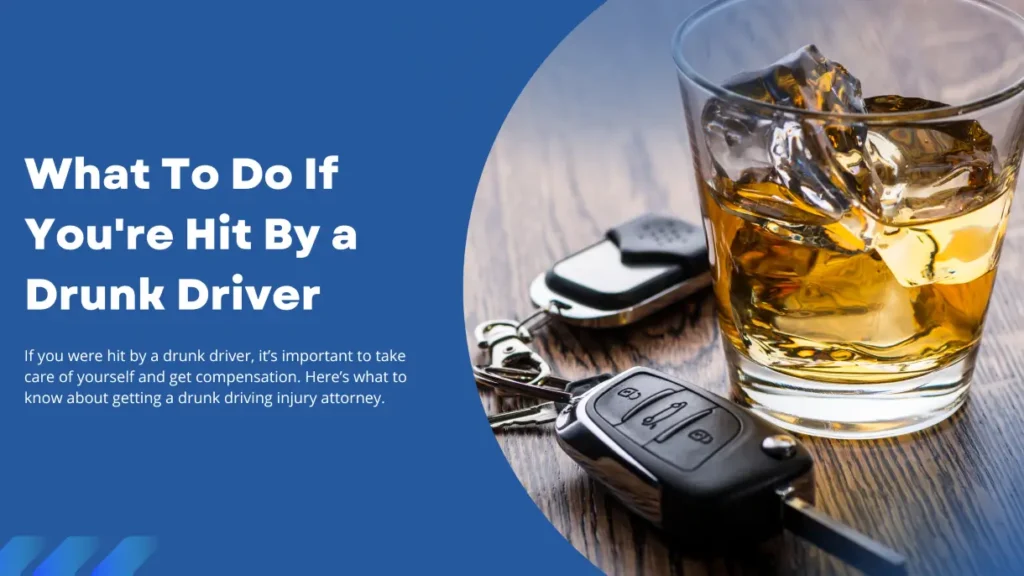Being hit by a drunk driver can be a shocking and distressing experience, often leaving victims uncertain of their next steps. Blood alcohol concentration (BAC) plays a crucial role in DUI laws, with legal implications for drivers operating a vehicle with a BAC of 0.08% or higher. Drunk driving accidents frequently result in serious injuries and high medical costs, making it essential to act quickly to protect your health and legal rights. By knowing the appropriate steps to take, such as calling for help, gathering evidence, and seeking legal guidance, you can better ensure a smooth recovery and pursue fair compensation. Understanding what to do if you’re hit by a drunk driver can make all the difference during a difficult time.
Ready to see if you may qualify? Click here to get a FREE, no-obligation consultation before starting your claim.
Hit By a Drunk Driver? What To Do & Key Takeaways
- Call 911 immediately to ensure medical assistance and document injuries. Police presence can also help establish a record of the drunk driver’s condition.
- Gather essential information from the scene, including the driver’s insurance, contact details, and any witness statements.
- Document the accident thoroughly with photos of the vehicles, damage, and surroundings.
- Seek medical care even if injuries seem minor, as this provides documentation for your case.
- Contact an experienced car accident lawyer to help protect your rights and negotiate with insurers. A car accident lawyer can evaluate your case potential, particularly regarding the collection of punitive damages, and guide you through the legal options available.
What To Do Right After Getting Hit by a Drunk Driver
Being in an accident with a drunk driver is overwhelming, but acting quickly and correctly can make all the difference in minimizing the stress and pain of the aftermath. Below are the critical steps to follow immediately to protect your health, safety, and rights. It is also important to negotiate with the drunk driver’s insurance company before pursuing legal action, as this can lead to more favorable settlements.
Call 911
If you or anyone else involved in the accident is injured, call 911 right away. Emergency responders can provide medical assistance, and the police can record key details about the incident. This initial report is essential, especially for documenting that the other driver may have been intoxicated. Even if you feel unhurt, it’s best to seek medical evaluation, as some injuries may not be immediately obvious.
Exchange Insurance and Contact Information
Ask the police to facilitate the exchange of information with the other driver, including insurance details, name, and contact information. Make sure to record the driver’s license number and license plate details. This information will be necessary for both insurance claims and any legal action. If the at-fault driver is uninsured or underinsured, you may need to file a claim with your own insurance company.
Document the Scene
Capture the accident scene with photos, including vehicle damage, road conditions, and any relevant street signs. Also, note anything unusual about the other driver’s behavior, as this may support your case if the driver was impaired. If there are witnesses, gather their contact information, as they may provide helpful statements.
Talk to a Lawyer
Consulting a drunk driving accident lawyer is beneficial early in the process, as they play a crucial role in securing compensation for losses such as medical expenses and emotional distress. A lawyer can guide you on gathering evidence, navigating insurance claims, and understanding your legal options. Legal representation also helps ensure you receive fair compensation for medical bills, lost wages, and pain and suffering.
Is a Drunk Driver Automatically at Fault for an Accident?
Many people assume that a drunk driver is always at fault in a car crash, but this is not necessarily true. Although intoxicated driving is illegal and dangerous, establishing fault often requires proof that the driver’s impairment directly caused the crash. In some cases, victims may share a degree of fault, especially in states that apply comparative fault rules. For example, if the victim was speeding or ignored traffic signals, they might bear some responsibility for the accident.
When fault is shared, the amount of compensation you can claim may be reduced according to your degree of responsibility. In certain states, this could mean receiving a lower settlement or, in rare cases, no compensation at all if your own actions significantly contributed to the accident. Understanding how fault is determined in drunk driving accidents can clarify your legal standing and potential compensation, highlighting the importance of legal guidance to protect your rights.
How Drunk Driving Accident Settlements Work
Settling a claim after a drunk driving accident can offer a faster resolution than going to court, but it’s important to understand how the process works. Drunk driving accident settlements typically involve negotiating with the impaired driver’s insurance company, which may try to offer a quick, low settlement. However, accepting a settlement means you waive any future claims, so it’s crucial to ensure that the compensation fully covers all medical costs, lost wages, and other damages. Drunk driving crashes can have severe consequences, and victims may seek compensation through legal actions for the tragic impact on their lives and families.
In some cases, victims may pursue additional claims in court, particularly if the insurance settlement falls short or if the driver was especially negligent. Courts may award punitive damages, which are intended to punish the driver and deter similar behavior. However, keep in mind that collecting punitive damages often requires going to trial. Consulting a lawyer can help victims determine whether a settlement offer is fair and whether further legal action could yield more comprehensive compensation.
Victim Restitution vs. Civil DUI Lawsuits
When a drunk driver is convicted, victims can pursue victim restitution to recover specific financial losses, such as medical expenses and lost wages. This type of compensation is typically limited to direct economic damages and does not cover non-economic losses like pain and suffering. Victims may still file a civil lawsuit for additional damages if restitution is insufficient.
“No-Fault” Insurance States
In no-fault insurance states, drivers generally turn to their own insurance for coverage after an accident, regardless of fault. This can limit options for legal action against the drunk driver unless the injuries are severe. If injuries meet a certain threshold, victims can file a liability claim or personal injury lawsuit against the at-fault driver for additional compensation.
Can a Drunk Driver’s Passengers Sue the Driver for Injuries Sustained in an Accident?
Passengers injured in a drunk driving accident may be entitled to seek compensation from the driver at fault, including the impaired driver who caused the accident. Just like other accident victims, passengers can pursue claims to cover medical bills, lost wages, and pain and suffering. However, some factors may affect a passenger’s ability to recover compensation, such as whether they knowingly got into the vehicle with an intoxicated driver.
In cases where a passenger willingly entered a car with a visibly impaired driver, some states may consider this an assumption of risk, which can reduce or eliminate the passenger’s ability to claim damages. This principle may be applied if the passenger had other transportation options or knew the risks involved. Nevertheless, a personal injury attorney can help injured passengers understand their rights and determine the best course of action for seeking compensation, even in complex cases where the passenger’s own decisions might affect the claim.
Can Family Members of People Hit by DUI Drivers Get Compensation?
When a family member is severely injured or killed by drunk drivers, the legal implications and potential remedies available to victims often extend far beyond the immediate victim. Family members, such as spouses or dependents, may be eligible for compensation through a wrongful death claim or loss of consortium claim. Wrongful death claims seek to provide financial support for families after the loss of a loved one, covering expenses like funeral costs, medical bills, and lost income that the victim would have contributed.
Loss of consortium claims, while less common, allow family members to seek compensation for the emotional and relational impact of losing a loved one’s companionship, guidance, or support due to a serious injury. Family members should be aware that statutes of limitations apply to such claims, so acting quickly is important. A qualified attorney can help families understand their rights and pursue the compensation needed to secure their future after a tragic DUI accident.
Do I Need to Hire a Lawyer?
Navigating the legal process after a drunk driving accident can be challenging, especially when dealing with complex insurance policies and settlement negotiations. Drunk driving accident lawyers play a crucial role in helping victims navigate the aftermath of such incidents, ensuring you have a knowledgeable advocate to guide you through each step and fight for the compensation you deserve. An experienced attorney can handle communication with insurance companies, gather necessary evidence, and help assess the full scope of damages, including future medical expenses and pain and suffering.
A lawyer’s expertise can be especially valuable if the insurance company offers a low settlement or if there are questions about fault. Many personal injury attorneys work on a contingency basis, meaning they only get paid if you win, making legal representation accessible even if you’re facing financial challenges. With a lawyer on your side, you can focus on recovery while they handle the legal aspects of your case.
Hire an Auto Accident Lawyer
Finding the right lawyer after a drunk driving accident is crucial for protecting your rights and securing fair compensation. Auto accident attorneys with experience in DUI cases understand the specific challenges involved, from proving negligence to handling insurance negotiations and potential court proceedings. Look for a lawyer with a strong track record in drunk driving cases, as their expertise can make a significant difference in the outcome of your claim.
During your initial consultation, ask questions about their experience, success rates, and approach to handling DUI accident cases. Many personal injury lawyers offer free consultations, so you can discuss your case before making a decision. A skilled attorney can help evaluate your case’s potential, provide guidance on your best options, and fight to ensure you receive the compensation you deserve for your injuries and losses.
Ready to see if you may qualify? Click here to get a FREE, no-obligation consultation before starting your claim.

